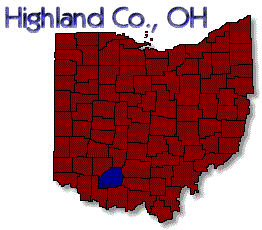Sgt. George N. Bishir
My Great-Great Grandfather, George N. Bishir was born Jan, 1835
in Ohio, died 9
Apr 1906 in Lynchburg, Ohio, and was buried in Masonic Cem.,
Lynchburg, Ohio.
He was a Cooper by trade.
George was described as being 5 feet 8 and three quarters inches
tall with fair
complexion, dark hair, and blue eyes. He served as a Private and
later as Corporal
and then Sergeant in Co. "B", 48th Regt., Ohio Volunteer Infantry
during the Civil
War. He enlisted in Ohio in October, 1861, as one of the first
sixty volunteers in the
48th OVI and his unit served as a part of U.S. Grant's Army of
the Tennessee in
the fourth brigade of the fifth divsion under General William T.
Sherman.
His
regiment's baptism of fire occurred early on the morning of April
6, 1862 when it
was attacked in its camp at Shiloh, Tennessee. The 48th fought
bravely, losing 20
killed, 92 wounded and two taken prisoner.
Following Shiloh, the
48th drove the
Confederates west to the siege and capture of Corinth,
Mississippi in late May.
After the abortive overland move south toward Vicksburg, the 48th
was present
when Gen. Sherman unsuccessfully attacked Chickasaw Bluffs in
December, 1862
and had a part in the capture of Arkansas Post under Gen.
McClernand in January,
1863. These were just the first of several battles that lead up
to the seige and
capture of Vicksburg in July of 1863. After the fall of
Vicksburg, George's unit
became part of General Banks' campaign up the Red River in
western Louisiana.
On April 8, 1864 after a desperate action near Sabine Crossroads,
LA in which all
of their ammunition was expended, his entire regiment was
surrounded and
captured. (This battle was also known as the battle of
Mansfield.) The Confederates
took him to a prison "pen" in Tyler Texas (known as Camp Ford),
where he
remained for six months awaiting exchange. He was parolled at Red
River Landing,
LA in October, 1864 and reported for duty a few days later in New
Orleans. His
unit was exchanged shortly thereafter and he was granted his
"veteran" furlough in
January of the following year.
(In February, 1864, George and
most of the rest of
his regiment had reenlisted for another three years at which time
they had been
promised a 30 day furlough - it had been postponed due to their
immediate
departure for the Red River.)
In 1865 he fought in the siege of
Fort Blackly,
Alabama. The victory there gave the Union army posession of
Mobile and cut the
Confederacy in two.
At the conclusion of the war, the regiment
numbered just 165
(over 900 had been part of the 48th when it was formed.) George
was sent with his
unit to Texas after the war and was discharged in Galveston in
May of 1866.
According to his pension application, during his stay in prison
he contracted through
exposure "ague and fever. Also he was attacked with chronic
diarrhea and Scurvy
while in prison which he believes is chargable to the use of
unwholesome food."
Later, while stationed in Galveston, Texas after the war he
contracted "sore eyes"
due to the "sand which was flying in the air" resulting in
partial loss of his eyesight.
He further contended that these disabilities resulted in general
disability - "disease of
the Kidneys and Liver, pain in the back, heart disease, and loss
of teeth." Based on
these contentions, he was granted a pension in 1890 of $14 per month.
Shortly after the war, George married Delilah Morsman at the home
of Jonathan
Reuse, just outside the corporate limits of Lynchburg, Ohio.
(Jonathan later married
Delilah's sister.) George and Delilah lived in Lynchburg and had
five children - four
were living in 1900.
|

